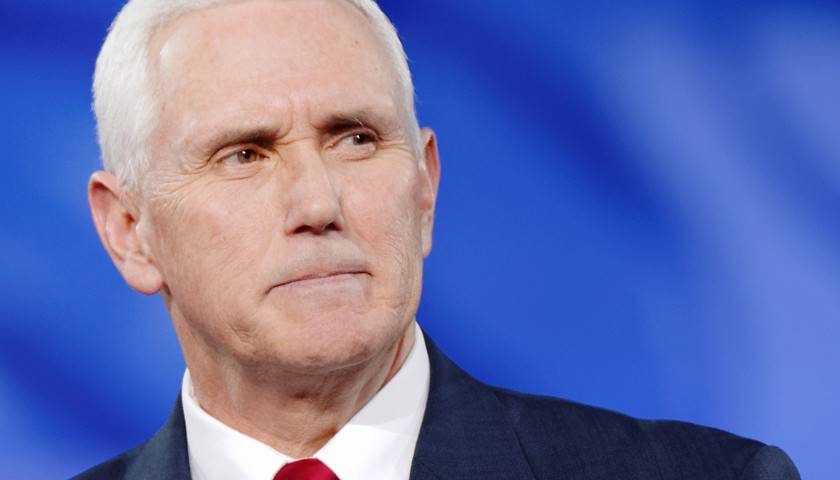by John Hendrickson
Former Vice President Mike Pence in a speech before the New Hampshire Institute of Politics at Saint Anselm College and in an article in The Wall Street Journal warned Republicans and conservatives about the danger of populism. The former Vice President argues, in echoing Ronald Reagan’s 1964 address, that it is “a time for choosing” for Republicans whether to continue to follow the “siren song” of populism or return to true conservatism. It is clear that Pence is not only drawing a line in the sand and forcing a debate over conservatism, but also distancing himself from former President Donald Trump and those who support his policies. Nevertheless, Pence fails to understand that the conservative populism he is denouncing is actually rooted within the American conservative tradition.
Debates within and amongst conservatives is nothing new. The conservative movement contains various “schools of intellectual thought” over what conservatism means and how conservatives should shape public policy. Vice President Pence argues that the Republican Party must return to traditional conservatism. “If we are to defeat Joe Biden and turn America around, the GOP must be the party of limited government, free enterprise, fiscal responsibility and traditional values,” wrote Pence.
Pence is defining traditional conservatism based upon the principles of limited government, free enterprise, fiscal responsibility, and traditional values. Further, he correctly notes that individual “rights come from God and nature, not from the state.” In addition, Pence argues that just “like our founders, we know the imperfect nature of men and women and that granting them unlimited power imperils liberty.” This is an important pillar of conservatism, that is, that human nature is flawed because of original sin. Pence is also correct in referencing the need for conservatives to uphold and defend constitutional principles such as federalism.
Conservatives would largely agree with Pence’s definition of conservatism, but he only offers a surface view of conservatism. Pence warns about the danger of populism and he argues that this is a political tool of progressives and he references William Jennings Bryan and the “Kingfish” Huey Long as examples. Further Pence argues that populists within the Republican Party are a threat to limited government, traditional values, and even the Constitution. Further, these Republican populists favor abandoning “American leadership on the world stage” and “embracing a posture of appeasement in the face of rising threats to freedom.” Pence’s other indictment is that Republican populists are abandoning free enterprise.
Is Pence correct that populism is not only wrong, but also rooted in liberalism and progressivism and that these Republican populists are not conservative? First, Pence needs to define what policies of the Trump administration were not conservative. Pence acknowledges that the Trump administration governed as conservatives, but now Trump has abandoned conservatism. Does this mean that the Trump America First agenda was conservative according to Pence?
In 2016, President Trump campaigned on what was considered to be a new approach to conservatism. He called for restrictions on immigration, building a border wall to secure the border, a restrained foreign policy, and he was highly critical of free trade and openly called for tariffs to protect manufacturing. This agenda has been referred to as America First, conservative nationalism, and conservative populism. It also fits within the framework of the paleoconservative tradition.
Nevertheless, the ideas that shaped President Trump were not new nor were they a departure from conservatism as former Vice President Pence would suggest. In fact, President Trump was rediscovering an older conservative Republican tradition. As an example Patrick J. Buchanan wrote that “in leading Republicans away from globalism to economic nationalism, Trump is not writing a new gospel. He is leading a lost party away from a modernist heresy – back to the Old-Time Religion.” Buchanan during the 1990s campaigned for the Republican nomination championing similar ideas as Trump.
The conservative nationalist tradition can be traced back to the American founding. Specifically, Alexander Hamilton and the Federalists. President Calvin Coolidge even credited Hamilton and the Federalists and later the Whigs as the source of the Republican Party’s heritage. Former Vice President Pence should consider the conservatism of the 1920s. Conservatives such as Presidents Warren G. Harding and Calvin Coolidge not only challenged progressives, but their policy agenda was based on conservative nationalism. Harding and Coolidge not only supported a restrained foreign policy, but also protective tariffs and restricting immigration. They also placed an emphasis on limiting government by reducing spending, paying down the national debt, and reducing tax rates. Harding and Coolidge actually reduced government.
Vice President Pence appears to be fighting against conservative nationalism and embracing the neoconservative agenda that was embraced by President George W. Bush’s administration. Neoconservatism and the Pence-style of conservatism dominated the Republican Party before Trump. What were the results: a full retreat on the cultural war and traditional values, engaging in costly wars to promote democracy, free trade agreements which led to the devastation of manufacturing, middle-class jobs, and massive trade deficits which led to the rise of China, and uncontrolled immigration. Plus, the federal government, along with the national debt, continued to grow. It was this “traditional” conservatism that idolized and worshiped at the golden alter of democracy and free trade.
Is this the conservatism that we want to return to as a nation or a movement? In fact, during the first Republican presidential candidate debate Vice President Pence resembled former President George W. Bush more than President Ronald Reagan, especially in his advocacy of sending more dollars and support to Ukraine. This foreign policy approach, along with free trade, has more in common with progressives such as Presidents Woodrow Wilson and Franklin D. Roosevelt. Pence’s approach to Ukraine is Wilsonian.
Pence is attempting to proclaim himself as the true heir to Reagan. When examining the legacy of President Reagan too many conservatives forget that Reagan, even with all of the free market and liberty rhetoric, often practiced a restrained foreign policy and implemented trade policies that were considered protectionist. Some even argued that Reagan was the most protectionist president since Herbert Hoover.
Former Vice President Pence is correct that conservatives do need to do more to defend traditional values and constitutional government. The Republican Party has failed at limited government and has contributed to the largess of government and the national debt. However, conservatives and Republicans should not fall for the “siren song” of returning to the neoconservative or “traditional” conservative foreign and trade policies that Pence is embracing.
Moving forward conservative nationalism provides the best blueprint to solve our national policy problems. Republicans should start looking to “old right” conservatives such as Warren G. Harding, Calvin Coolidge, Herbert Hoover, and Robert A. Taft for wisdom. Thankfully, the Republican Party has champions of this tradition. Senators Josh Hawley (R-MO) and JD Vance (R-OH) are two of the most important policy leaders fighting for an America First policy agenda.
Vice President Pence may disagree with what he calls populism, but he is wrong to suggest that it does not have a home within the conservative movement. America First policies were a large part of conservative politics until they were abandoned in the post-World War II era by Republicans. Plus, Americans are supportive of an America First approach, which is why former President Trump has a commanding lead in the polls.
Some conservatives and Republicans such as Pence may reject and disagree with conservative nationalism, but they are wrong to write it off as not being conservative.
– – –
John Hendrickson is policy director for Iowans for Tax Relief Foundation. Republished with permission from The Center Square.
Photo “Mike Pence” by Michael Vadon CC2.0.






